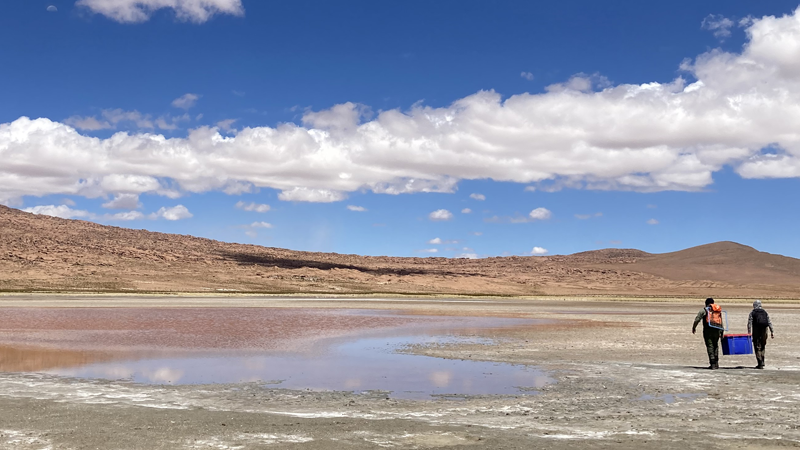Photo: Alconcha Salt Flat Conservation Area
Teck is committed to responsibly managing biodiversity and land use, and we have set a goal to work towards securing a net positive impact (NPI) on biodiversity. In furtherance of this goal, we partnered with the Ollagüe Quechua community to develop a biodiversity conservation area for the Alconcha Salt Flat, a unique and high-value wetland ecosystem near our Quebrada Blanca Operations. The initiative – the first of its kind in Chile – demonstrates the innovative results that can come from collaboration between industry and communities. In addition to leading to the creation of an important conservation area, this work will also protect and preserve water rights for the communities and ecosystems in the area.
About the initiative
The creation of the Alconcha Salt Flat Conservation Area is the result of years of collaboration between Teck and the Ollagüe community, resulting in an agreement to create a land conservation area in the community’s territory. Teck performs impact assessments related to biodiversity in and around all of our projects and operations, and often seeks to create conservation areas nearby to serve as sanctuaries for local flora and fauna. This maximizes local biodiversity resilience and sets the stage for future post-closure site rehabilitation. In 2019, in order to support biodiversity preservation at our Quebrada Blanca (QB) Operations, Teck began discussions on the conservation of a local area with the Quechua Indigenous community of Ollagüe, who own and steward much of the region’s land.
An analysis of six sites was conducted to assess the similarities to the site-impacted area in terms of value and ecosystem equivalence. The Alconcha Salt Flat was identified as the location with the greatest potential for ecosystem value. After several months of studies and discussions between Teck and the Ollagüe Quechua community, in August 2020 both parties signed an agreement to preserve, improve and develop a conservation project in the area.
Creating an innovative conservation model
The Salar de Alconcha, or Alconcha Salt Flat, is located approximately 30 kilometers east of Teck’s QB Operations, and 44 km northwest of the village of Ollagüe near the Bolivian border. This unique wetland ecosystem is located at 4,123 meters above sea level, and supports delicate ecosystems of high environmental value.
The agreement governing the Alconcha Salt Flat Conservation Area is innovative in a number of ways, and is an example of successful collaboration between mining companies and local communities to achieve shared objectives.
“This initiative serves as a pilot case for a future land compensation model for the mining industry - one which focuses on active participation of Indigenous communities,” says Norberto Parra, Social Studies Manager, Teck Chile.
The Salar de Alconcha is at risk of drying up due to water extraction in the area. The establishment of this conservation area will not only protect the unique biodiversity in the region, but also positively impact water use practices. Teck transferred the mining and water rights to this area back to the Chilean government as part of the agreement. As a result, the agreement also improves water security for the surrounding communities and environment - a critical issue in this water-scarce region.
“By dedicating our mining properties and water rights of the salt flat for conservation, Teck is going above and beyond requirements and showing that sustainability can be at the heart of mining,” says Herman Urrejola, Social Management and Communities Director, Teck Chile. “This agreement leaves a legacy for current and future generations.”
Going forward, Teck will continue to build a long-term relationship with the Ollagüe community by partnering to monitor and conduct research on the Alconcha Salt Flat Conservation Area.
Learn more about our approach to Biodiversity and Reclamation on our website.


